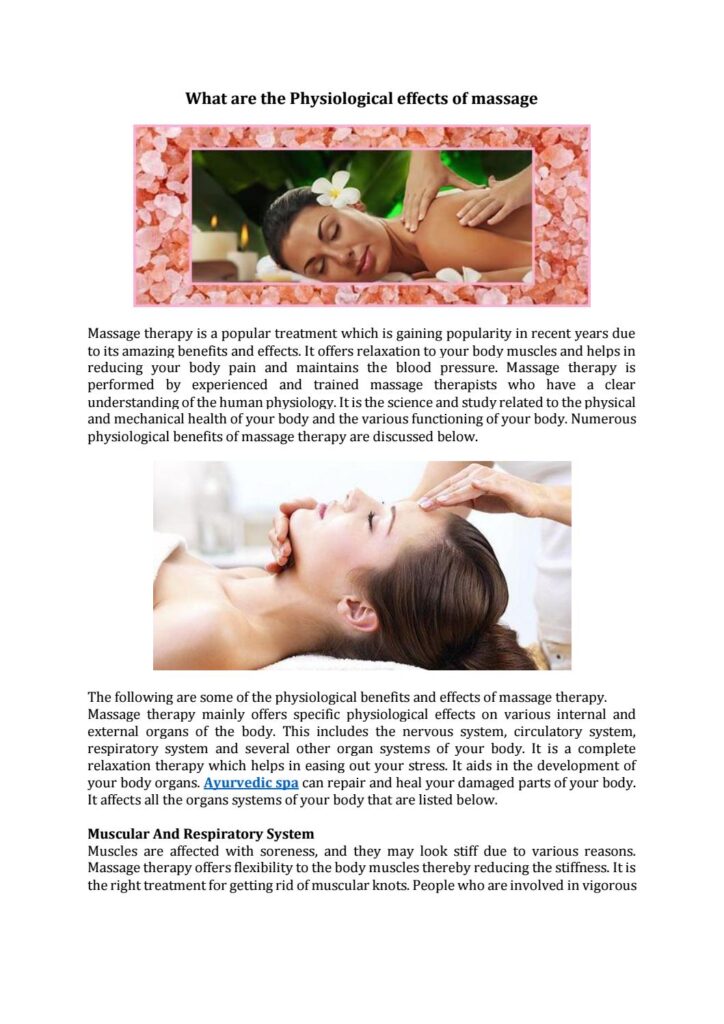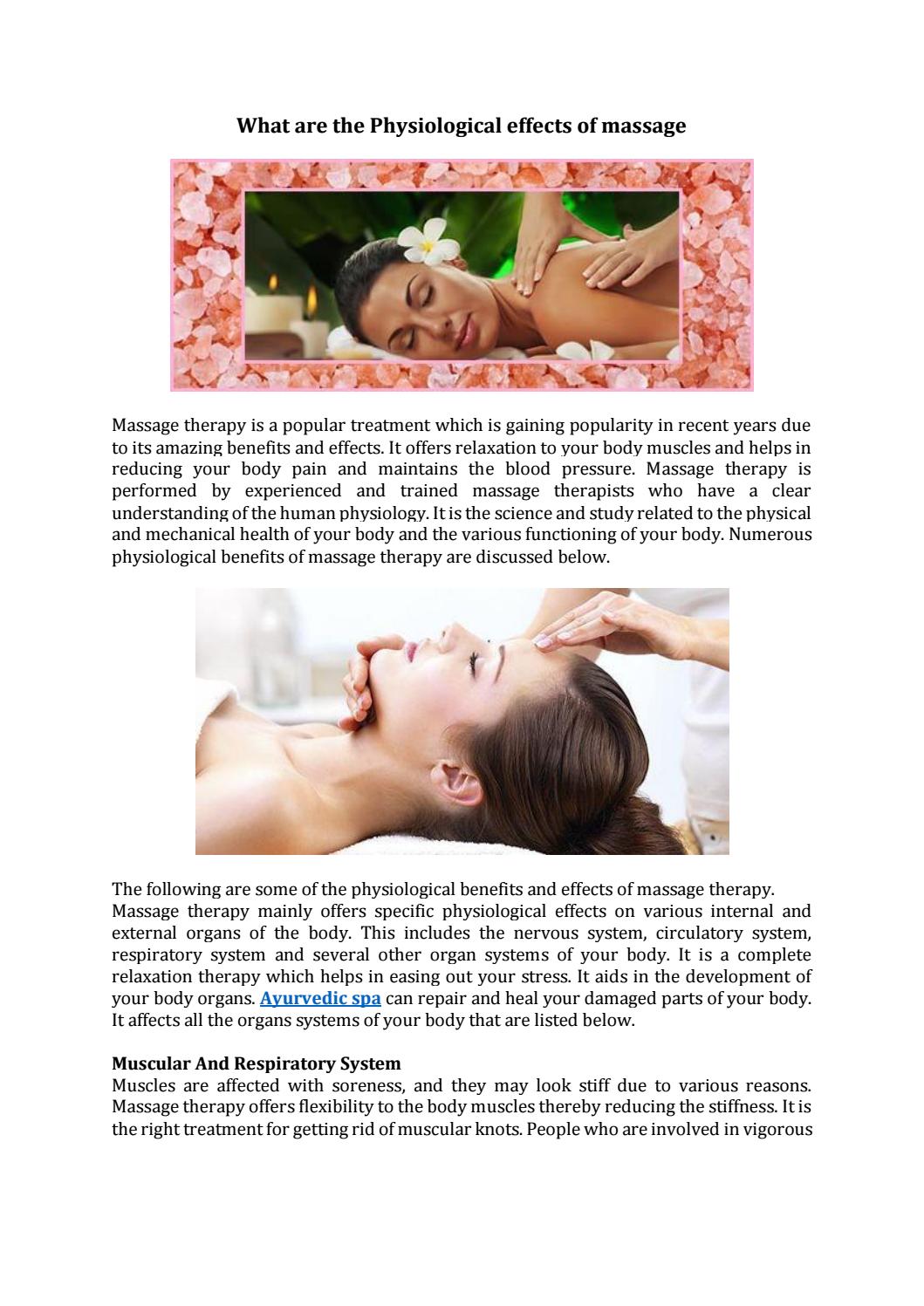In this article, we’ll explore the wonderful world of massage and the many physiological benefits it offers. From relieving muscle tension to improving blood circulation, massage therapy has a multitude of positive effects on our bodies. Whether you’re looking to relax and unwind or seeking relief from specific physical ailments, discovering the physiological benefits of massage might just be the answer you’ve been searching for. So, let’s dive in and explore how this therapeutic practice can enhance your overall well-being.
Relaxes Muscles
massage therapy is well-known for its ability to relax muscles and promote overall muscle health. During a massage, the therapist uses various techniques to apply pressure and manipulate your muscles, which helps increase blood flow to the muscles. This increased blood flow delivers oxygen and nutrients to the muscles, aiding in their relaxation and recovery. Not only does massage relieve muscle tension and stiffness, but it also reduces muscle soreness, making it an excellent option for athletes or anyone experiencing muscle strain or fatigue. Moreover, regular massages can improve flexibility and range of motion, allowing for greater mobility and ease of movement in your everyday activities.
Reduces Pain and Inflammation
One of the remarkable benefits of massage therapy is its ability to alleviate pain and reduce inflammation in the body. When you receive a massage, your body releases endorphins, the body’s natural painkillers, which helps stimulate pain relief and create a sense of well-being. Additionally, massage therapy decreases the production of stress hormones like cortisol, which are known to increase pain sensitivity and inflammation in the body. By decreasing these stress hormones, massage can provide effective relief for chronic pain conditions such as arthritis, fibromyalgia, and migraines. The hands-on manipulation of muscles and tissues during a massage also helps reduce inflammation in joints and muscles, providing relief and promoting healing.

This image is property of d2jx2rerrg6sh3.cloudfront.net.
Enhances Circulation
Massage therapy has a profound impact on improving blood circulation throughout the body. The pressure and rhythmic motions applied during a massage encourage blood vessels to dilate, allowing for better blood flow. This increased circulation not only delivers oxygen and nutrients to your muscles, but it also helps remove waste products and toxins from your body. Improved circulation also plays a vital role in promoting lymphatic drainage, which helps remove excess fluid and toxins from the body’s tissues, ultimately boosting immune function. Additionally, massage therapy can help decrease blood pressure, as it promotes relaxation and reduces stress, leading to overall improved cardiovascular health.
Boosts Immune System
Regular massage therapy is like a boost to your immune system. Studies have shown that massage stimulates the production of lymphocytes, which are white blood cells that play a crucial role in defending the body against infections and illnesses. Increased white blood cell count helps enhance your immune response, ensuring that your body is better equipped to fight off pathogens and foreign invaders. Additionally, massage activates the body’s natural defense mechanisms, boosting the overall efficiency of your immune system. By incorporating massage therapy into your routine, you can reduce the risk of infections and illnesses, keeping you healthier and more resilient.

This image is property of image.isu.pub.
Promotes Relaxation and Stress Relief
One of the main reasons people seek massage therapy is for its ability to promote relaxation and relieve stress. The gentle touch, soothing strokes, and tranquil environment all contribute to calming the nervous system and inducing a state of relaxation. This relaxation response helps reduce the levels of stress hormones in the body, such as cortisol and adrenaline, while simultaneously promoting the release of feel-good hormones like serotonin and dopamine. The overall effect is a profound sense of relaxation, tranquility, and improved mental well-being. Regular massages can be an excellent tool for managing anxiety, depression, and overall stress levels, allowing you to find balance and rejuvenation in your daily life.
Improves Posture
Whether you spend long hours sitting at a desk or engaging in physically demanding work, maintaining proper posture is crucial for musculoskeletal health. Massage therapy can play a significant role in improving and correcting posture-related issues. Massage relieves muscle imbalances by targeting specific muscle groups that may be tight or weak, helping to restore balance and proper alignment. Additionally, regular massages can reduce muscle tension that pulls on the spine and causes postural abnormalities. By aligning the body’s musculoskeletal system, massage therapy helps prevent and correct postural imbalances, leading to improved posture, reduced pain, and enhanced overall physical well-being.

This image is property of healthwiseoptimummassage.com.
Encourages Better Sleep
If you struggle with sleep issues or insomnia, massage therapy can be a natural and effective way to promote better sleep. The relaxation and stress-reducing benefits of massage therapy can create an ideal environment for a good night’s sleep. Massage promotes relaxation by calming the nervous system and reducing anxiety levels. This, in turn, regulates sleep patterns and improves sleep quality and duration. The physical manipulation of muscles during a massage can also alleviate insomnia and other sleep disorders by releasing tension and promoting relaxation. By incorporating regular massages into your routine, you can enjoy a more restful, rejuvenating sleep, allowing you to wake up feeling refreshed and energized.
Aids in Injury Recovery
Massage therapy is a valuable tool when it comes to injury recovery and rehabilitation. It can speed up the healing process of soft tissue injuries, such as sprains, strains, and muscle tears, by increasing circulation to the injured areas. The improved blood flow delivers essential nutrients and oxygen necessary for tissue repair and regeneration. Massage also helps to reduce scar tissue formation, allowing for better healing and enhanced range of motion during rehabilitation. Moreover, the hands-on manipulation of muscles and tissues during a massage helps break down adhesions and knots, facilitating the healing process and preventing further injury.
This image is property of imgv2-2-f.scribdassets.com.
Regulates Hormones
Massage therapy has a profound impact on the body’s hormone regulation. Regular massages can help balance stress-related hormones and reduce the levels of cortisol, which is known as the stress hormone. Reduced cortisol levels lead to a decrease in stress, anxiety, and tension, promoting an overall sense of well-being. Massage therapy also stimulates the release of serotonin and dopamine, neurotransmitters that play a crucial role in mood regulation and happiness. By regulating hormone production and secretion, massage therapy can contribute to a more stable emotional state and improved mental health.
Improves Digestion
The benefits of massage therapy extend beyond muscle and mental health. Massage can also improve digestion and promote overall digestive health. The gentle pressure applied during a massage stimulates peristalsis, the wave-like contractions of the digestive tract that propel food through the system. This stimulation helps regulate bowel movements, reducing constipation and bloating. Improved blood circulation resulting from massage therapy also enhances nutrient absorption in the digestive system. By promoting overall digestive health, massage can help alleviate digestive issues and contribute to a healthier, more efficient digestive system.
In conclusion, the physiological benefits of massage therapy are extensive and far-reaching. From relaxing muscles and reducing pain and inflammation to boosting the immune system and encouraging better sleep, massage therapy offers a multitude of benefits for your overall well-being. By incorporating regular massages into your routine, you can experience the remarkable effects of improved circulation, enhanced relaxation, injury recovery, hormone regulation, and improved digestive health. So go ahead and treat yourself to a massage, and reap the numerous physiological benefits that can transform your body and mind.

This image is property of www.newcastlesportsinjury.co.uk.

